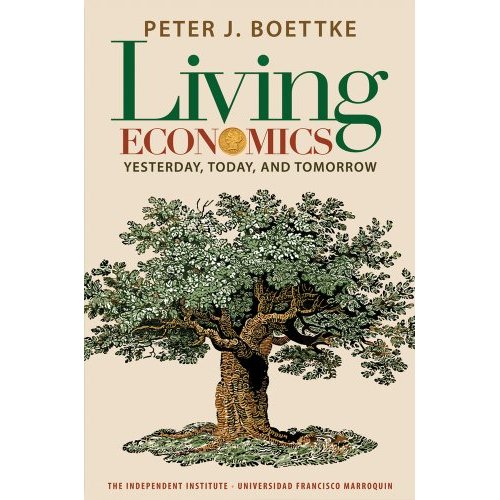Economics, Book/Article Reviews
Pete Boettke’s Living Economics
 This is the book Pete Boettke was meant to write.
This is the book Pete Boettke was meant to write.
If you’re a regular of BHL, you’ll be familiar with the guest-blogging that Pete has done here. Or maybe you know him from his blogging at Coordination Problem. If you’re lucky, like me, you’ve seen him lecture.
Pete was a faculty member at one of the first Institute for Humane Studies seminars that I ever attended, and he was inspirational. If you’ve never seen him talk, start by imagining your high school basketball coach. Now imagine a basketball coach who’s read just about everything there is to read in the history of economic thought, and written about most of it, who cares about it, and has it as his life mission to get you to care about it too. That’s Pete. One of the things I love about watching him lecture is that you can actually see the excitement bubbling up in him. His talks start off slowly, a bit halting, and little by little this energy builds up that is palpable, and contagious. By the time he’s done talking, you’re ready to run out on that court and give those other guys the whoopin’ they deserve. Or, more likely, to get your ass in the chair and read, and write. Like it maters.
So I’m thrilled to see a book like this coming from Pete. Because it is exactly what he is about. Living Economics is about economics as a living, developing body of thought, springing from the roots of Richard Cantillon, Adam Smith, and David Hume, and blossoming today in the thought of Vernon Smith, James Buchanan, and Elinor Ostrom. It is, moreover, about economics as something that is to be lived. Economics, for Pete – and this is something you can see in the work of his students like Christopher Coyne, Peter Leeson, and Ben Powell – isn’t an idle intellectual pursuit but a vital tool for understanding the world around you, from the lofty heights (or murky depths) of politics to the mundane details of one’s day-to-day existence.
Boettke’s book traces what he calls the “mainline” of economic thought – the core questions and ideas that are alive in the work of Smith, Say, Mises, and others. These questions and ideas are what make economics the living discipline it is, in both of the senses described above. And while they might not always be in fashion – the “mainline” isn’t always “mainstream” – their power is always there for anyone who takes the time to pick up the books and engage with them.
And that’s true even when it feels like the “mainstream” of the academy is aligned against you. One of the things I respect most about Pete is his utter lack of tolerance for self-pity. It’s easy to tell yourself that the reason you haven’t gotten published is because the profession of economics won’t tolerate heterodox ideas. It’s easy to blame your marginalization on others. But not only is this a destructive story to tell oneself, it’s more often than not a false one. True, the economics profession has little tolerance for bad Austrian economics. But nor does it have much tolerance for bad Chicago economics, or bad Harvard economics. The lesson to take away isn’t that you need to abandon Austrianism in order to achieve professional success. It’s that you need to do what it takes to be a good economist, period.
Anyways, this is an exciting book from one of the most exciting and productive teachers and scholars of economics alive today. I hope you all read it. If you want, you can start with the preface, free. Chapter 1 is also available online. If you need a bit more inspiration, you can watch this video of Pete on teaching and communicating economic ideas. Pete has a short essay on the book in The Freeman, and the Independent Institute has a detailed summary of the book here. Now, get your ass in the chair and read!

